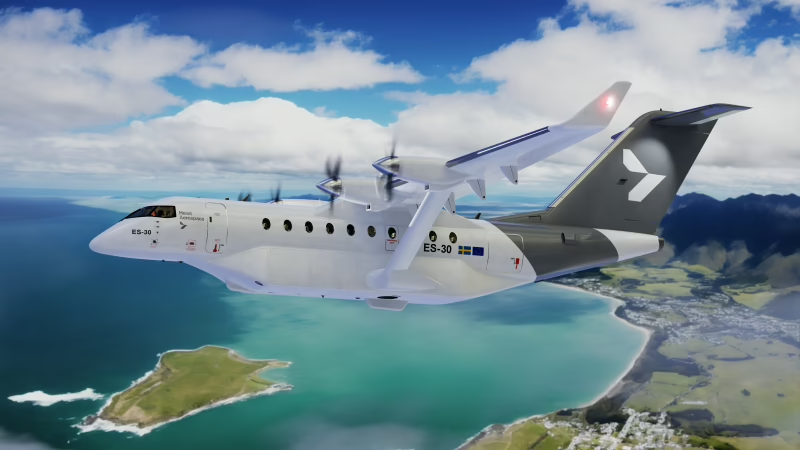
Air New Zealand has added Embraer, electric regional aircraft startup Heart Aerospace and hydrogen-electric propulsion developer Universal Hydrogen as long-term partners in the plan to replace its domestic fleet of De Havilland Canada Dash 5-Q300 turboprops with more sustainable aircraft from 2030.
The airline is already working with Airbus and ATR to understand the impact hydrogen and hybrid-electric aircraft may have on its network, operations and infrastructure. “Adding Universal Hydrogen, Embraer and Heart Aerospace will broaden our knowledge of the technologies being developed for potential future aircraft,” Air New Zealand Chief Sustainability Officer Kiri Hannifin said in a statement.
“This isn’t about selecting a new aircraft. It’s about growing our collective understanding to advance a new era of travel,” she said. The five partners selected are planning to develop hybrid-electric and hydrogen-powered aircraft with 30-200 seats by 2035.
Air New Zealand has joined the group of airlines, lessors and manufacturers advising Embraer’s Energia project, which is exploring a range of sustainable aircraft concepts with up to 50 seats. Embraer in turn has become a partner in the airline’s Mission Next Gen Aircraft initiative.
Now in its second phase, the Energia project has focused its studies on 19- and 30-seat regional airliners with hybrid-electric and hydrogen fuel-cell propulsion. The hybrid concepts could be ready to enter service in 2030 with a range of 500 nm-plus and the fuel-cell concepts in 2035 with 200-nm-plus range.
Swedish startup Heart is developing the ES-30, a 30-seat aircraft with an all-electric range of 200 km (108 nm), increasing 400 km using a hybrid-electric reserve system based on a turbogenerator burning sustainable aviation fuel (SAF). With 25 passengers, the ES-30 can fly up to 800 km, Heart says.
The ES-30 is planned to enter service in 2028. United Airlines and Mesa Air Group have invested in Heart and placed pre-orders and options for 300 aircraft. In September 2022, Air Canada invested in Heart and placed a pre-order for 30 aircraft. New Zealand’s Sound Air is among airlines that have signed letters of intent for the ES-30.
Universal Hydrogen (UH2) is developing a hydrogen-electric powertrain retrofit for the ATR 72-600, which it plans to have on the market by 2026 along with a logistics system to delivery hydrogen to airports and into aircraft using modular capsules. The conversion will reduce the seating capacity of the ATR-72 to 56 from 70.
UH2’s propulsion testbed, a modified Dash 8-300 with one its turboprop engines replaced by a 1-megawatt hydrogen fuel-cell powertrain, in undergoing taxis tests in Moses Lake, Washington, in preparation for first flight. The ATR-72 conversion is being developed by UH2 in Toulouse.
Of Air New Zealand’s existing partners, Airbus is studying a range of zero-emission liquid-hydrogen-fueled aircraft concepts under its ZEROe initiative. While Airbus is studying concepts with hydrogen-combustion turbofans, up to 200 seats and 2,000 km range, the favored candidate for entry into service by 2035 is a fuel-cell aircraft with up to 100 seats and 1,000-km range. A development decision is expected by 2025-26.
ATR has announced plans to develop the next generation of its family of aircraft, called ATR EVO, by 2030. This is planned to be a twin turboprop that can burn 100% SAF and featuring a new powerplant with hybrid capability.
Air New Zealand also has Victoria University of Wellington’s Robinson Research Institute to help the airline evaluate and validate aircraft propulsion technology as concepts develop and mature.
Separately, in December 2022 Air New Zealand announced four partners with which it is working to enable its first zero-emissions flight—either cargo or passenger—from 2026. The companies are Beta Technologies, Cranfield Aerospace Solutions, Eviation and VoltAero.
U.S. startup Beta is developing a five-seat electric vertical-takeoff-and-landing (eVTOL) aircraft, the Alia-250, for entry into service by 2025. Cranfield plans to modify the 9-passenger Britten-Norman Islander to hydrogen-electric propulsion for service entry in 2026.
U.S.-based Eviation is developing the Alice, a 9-passenger all-electric aircraft with a planned range at entry into service in 2027 of 250 nm. French startup VoltAero is developing a new family of hybrid-electric aircraft with 5-12 seats and a range of 200-500 km.
